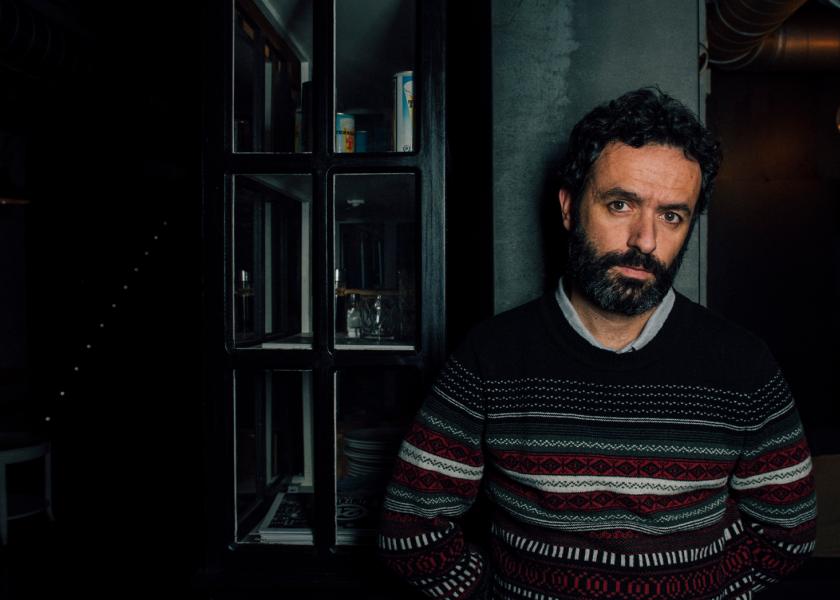Marta Etura
Beyond Baztán

The actress is premiering the second part of the film adaptation of 'The Baztán Trilogy', by Dolores Redondo. 'The Legacy of the Bones' is darker than the more complex first instalment of the saga, and the leading character —Inspector Amaia Salazar— shares with the woman who plays her much more than a magnetic and expressive face.
Approachable. Intelligent. Able. These are some of the adjectives that come to mind as one meets Marta Etura (San Sebastián, 1978). She is promoting the second film of The Baztán Trilogy, written by Dolores Redondo and directed by Fernando González Molina. Marta plays the leading character, a Detective Inspector from the Navarra Foral Police who has to solve a series of strange homicides with references to mythology and religion, and which serve as the starting point of this intricate story.
We met Marta for coffee in a bar in the centre of Madrid. The first thing that surprises us is that no one seems to recognize one of the best and most versatile actresses in Spanish cinema. And the second is that she is more expressive and accessible than one would expect from a woman who has managed to maintain considerable discretion throughout her twenty years of acting career, even more so in the era of social networks and constant public exposure.
The second and third instalments of the trilogy, to be premiered in April 2020, have been film in parallel. A total of 18 weeks accompanied by Chloe, her 18-month-old baby, who makes her eyes light up whenever she talks about her. “I appear in each and every one of the sequences; in that sense, the intensity of the film was brutal. But I’ve been lucky enough to have had my boyfriend and my little chubby baby with me! Otherwise, I would’ve gone crazy [she smiles]. Playing such a demanding character for so many hours is hard,” she explains.
The Baztán valley plays a decisive role in the book’s plot and also in the film. There, the crew was exposed to extreme weather conditions during the long filming period. However, for Marta Etura it was both a professional and a personal challenge. “Emotionally speaking, this is a very hard film. Amaia is deeply wounded as a result of a terrible childhood. On top of that, she has to deal with horrible cases as part of her daily life. Managing all those emotions for so long and so intensely was the greatest difficulty of all, but also the greatest pleasure.”
“Theatre is quite a trip, much more interesting from a performing perspective. However, what cinema generates, with the crew and all, is very powerful”
“In The Legacy of the Bones there are similarities between Amaia's life and mine, which is the compatibility of motherhood and work, but that’s something that happens to 90 percent of women. Her job and my job are very particular because they involve working long hours,” she says. "Motherhood has helped me understand many things about the character: I was experiencing things that Amaia was experiencing at the same time, even silly things like breastfeeding or holding a baby…”
A career under the spotlight
Thanks to Joaquín Oristrell’s 2003 film Sin Vergüenza, Marta Etura’s career took a great leap forward and is now defined by an ongoing search for good stories and by an outstanding versatility and discretion. Etura has always been there, especially in cinema, but also in theatre and dance. Which do you prefer? “I can’t choose. I love cinema, but theatre is quite a trip, much more interesting from a performing perspective. However, what cinema generates, with the crew and all, is very powerful. Like what happened with this film—you go away from home and delve into a story along with a team of more than 100 people, 12 hours a day for six months.”

Marta Etura photographed at the flower shop Margarita se llama mi amor, in Madrid. © Rafael Fabrés
Despite having had roles in well-known films for the general public such as Celda 211, The Impossible or Dark Blue Almost Dark, to name a few, Marta Etura can walk in the centre of Madrid or go into a restaurant without being noticed. It makes sense: “I’ve always wanted to focus exclusively on my profession — I’m an actress, that’s what I do; I also dance. I’ve managed to keep my private life in that field. It makes me sad that now with social networks it seems that you have to project an image of perfection or commitment. There’s an obsession with showing everything...”
Being an actress is a tricky profession for women of a certain age. Now that she is in her 40s, the question is inevitable: are there enough roles? “There are more,” she says. “And there will more and more. There will be more female directors, screenwriters and producers... The numbers will grow. It’s a fact. Women have entered the labour market, and nothing is going to stop us. This is a struggle that involves everyone — men and women. I see 40-year-old characters being played by 30 or 23-year-old actresses [laughs], and that is kind of weird.” Despite this, the star of Mientras duermes is optimistic: “We remain trapped in certain dynamics that we all must change. In fact, I want to believe many of them are already changing.”
“Women have entered the labour market, and nothing is going to stop us. This is a struggle that involves everyone – men and women”
We also broach the role of the media in the era of social networks, which make it all faster and less thoughtful. “How is it possible that everyone knows Belén Esteban but almost no one knows scientists or photographers or people from other areas who are doing amazing things in this country? Like, incredible things! I want to believe that, just as things regarding gender inequality are changing, this will also change.” She laughs heartily and makes a face: “I talk too much, I talk too much. It’s always the same in interviews. Then I read them and think: ‘Why wouldn’t you just shut up, Marta?’”



